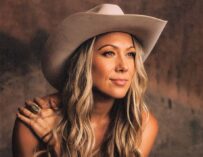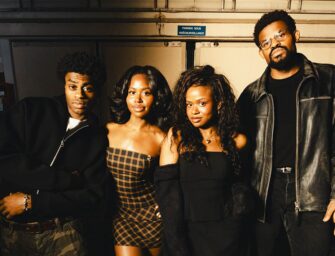
Sophie Jamieson: “I like to leave enough space for interpretation.” Photo: Tatjana Rueegsegger
The songwriter explores the process of writing new album ‘I Still Want To Share’ and losing confidence in her voice
London-based songwriter Sophie Jamieson has returned with her second album, I Still Want To Share, released via Bella Union. Building on the stark honesty of her debut, Choosing, the record deepens her exploration of human vulnerability, particularly the contradictions and complexities of love. Co-produced with Grammy Award-winner Guy Massey (Spiritualized, Manic Street Preachers, The Beatles), the album expands Jamieson’s musical landscape, incorporating omnichord and harmonium.
While her earlier work leaned into minimalism, I Still Want To Share embraces a fuller, richer sound, reflecting both the expansiveness and fragility of emotional connection. At its core, the album wrestles with the self-loss and transformation that love can bring, dissecting the exhilaration and unease of intimacy. Jamieson’s intensely captivating voice remains the centrepiece, carrying the weight of her introspective lyrics with both strength and vulnerability.
Shortly before the album’s release, we caught up with Jamieson to discuss its birth, her songwriting process, and insecurities about her voice…
More interviews with songwriters
Congratulations on the album, how are you feeling?
“Kind of tired. It’s been an interesting journey, this album campaign. It’s been quite difficult in some ways, and eye-opening. I feel like the musical landscape has changed quite a lot, even since my last record, which was just two years ago. There’s been quite a lot of new things to get to grips with, and not get to grips with as well.”
What has been particularly hard?
“Navigating social media, algorithms, and numbers. A lot of things are even harder and more competitive to crack through now. But otherwise, it’s been good. I always find that an album campaign makes you relive an album. You have to start talking about it and thinking about it and saying new things about it, and that always creates a full-circle effect, whether you thought that would happen or not. “
Does all that stuff rear its ugly head now, or are you thinking about it during the creative process itself?
“Oh yeah, it rears its ugly head during the creative process. I’ve found that the ugly head is reared and you write the song, and then you come around to record the song, and it rears again. You release the song, and then it comes out one more time.”
In what way does it come out during the process?
“It’s maybe more specific to this album. I didn’t realise what the album was about when I wrote it, it was control and anxiety within relationships and, maybe to some extent, an inability to communicate. I found that all of these things came up during the recording process in various ways. Also, some anxiety within my own voice, which I had to work through during the recording process.
“It was a continual coming up against the importance of letting go and finding that near impossible a lot of the time, including when it comes to attention to detail and trying to perfect things and trying to make people care as much as you do about something. I’ve actually found in the last few months that all of the stuff that began this album has heightened, up towards the point of putting it out, even the fact of responding to how other people are interacting with the process of putting it out.”
Are you constantly balancing authenticity and vulnerability with your own need for privacy and to work through things yourself?
“I generally haven’t found it to be something that I’ve had to think hard about. The nature of the way I write is that I like to leave enough space for interpretation, so that I don’t feel so vulnerable. I also know that a lot of what is being expressed is very vulnerable, but I’ve been doing this long enough that I’ve toughened up to the threat of exposure.
“I’ve released a lot of very exposing music, to be honest, without even realising how exposing it was at the time. With this album, in some ways, it’s some of my most vulnerable music, but it’s also, in the grand scheme of things, some of the least embarrassing stuff I’ve ever released. I’m kind of like, ‘Whatever.’”

Sophie Jamieson: “I really like songs that go somewhere else at the end.” Photo: Tatjana Rueegsegger
Does your songwriting process tend to always follow the same method and pattern?
“Yes and no. I generally tend to start a song with a first line. It’s normally a phrase or a sentence that I find melody within, and it usually goes from there. I’m generally lyric-driven, and I love finding rhythm and melody within phrases. There’s normally a first line that captivates me and that seems to pave the first brick on a promising road. Then I just usually follow the good smell.
“Up until recently, I’ve usually had a couple of songs slowly growing within. They gently germinate and then find the day when they’re meant to come out. That’s what happened with most of this album. I don’t think much of it was in the heat of the moment. There was a lot of emotion bubbling away underneath the surface, and every now and again, something coherent would emerge, although I think that’s changed for me in the last year or so. I’ve struggled with having something that’s consistently growing, and it’s been a bit more of a stop-start thing. I’ve lost a bit of confidence recently, and I’ve had to start approaching songwriting a bit differently.”
During the process of making these eleven songs, or subsequently?
“Subsequently. But in terms of these 11 songs, something that they have in common is a lack of thinking, which I think has served them very well. That’s partly how they found each other. I’ve written plenty of other songs within the time span that these were written in; some of which went on my first album, and many of which will be on the one after this. These ones have found a thread between them… a kind of longing that runs through all of them, or some kind of consistent thing that I carry with me, that was allowed to swim through them without too much conscious construction.”
Do you hear the finished version in your head quite early on, or does that also reveal itself slowly as you’re going down that road?
“I don’t normally have that, and that’s probably one of my favourite things about writing songs. I often get to after the second chorus or refrain, and then I’m like, ‘What else could happen here?’ I have a thing about outros. I really like songs that go somewhere else at the end, or that have a climax at the end, which means that I often write the bulk of a song, and I think it’s about one thing, and then a couple of days later, I write the end, and it actually reshapes the whole meaning of the song. I never actually know what the song is about until the last line, which is often the most revealing line. So, no, I might think I have an idea of what it might look like, but at this point, I know better than to think I know.”
At what point did Guy Massey get involved? What did he bring to the process, and how does that relationship work?
“Guy got involved through an old friend of mine, Fran O’Hanlon, who’s been telling me to work with Guy for a really long time. I started recording this album with somebody else initially, and it didn’t go very well. It wasn’t the right match; I don’t think he really understood me as an artist. It was a slightly crushing experience, and I wasted a few weeks and a lot of money on something that I then had to throw in the bin.
“It wasn’t my favourite time, and I had to take a couple of months off, recover a bit and give the songs some space. Then, I had to reach out again to friends and other people who might be an option to work with. I ended up having a cup of tea with Guy at a studio, he was so kind and asked me all the right questions, and really listened to me and got really excited about my songs and wanted to know what went wrong before and what I needed now.”
That sounds like a much better experience…
“Guy has an incredible CV, he’s hugely respected and has done so much incredible work over a long time, but really, I wanted to work with him because he’s a really tender human being and also incredibly self-sufficient. It was just me and him in the studio for most of the album, and he brought out the best in me, and he brought out a level of my creativity that I hadn’t really had the chance to access in the studio for a while – a real sense of play and fun. I also felt that he really could hear good things about me and my voice and my musicianship, that I couldn’t hear, and was able to encourage me in a way that I really needed. He was an absolute joy to work with and exactly the tonic that I needed.”

Sophie Jamieson: “There’s normally a first line that captivates me and that seems to pave the first brick on a promising road.” Photo: Tatjana Rueegsegger
What do you mean by a sense of play and fun?
“There were never any bad ideas. We tried out a lot of things and ditched a lot of things. In the past, I’ve had a bit less of that, or I felt more time pressure, ‘We’re going to do this this way, and it’s going to work.’ I’ve felt less like there was the space to try something out and then be like, ‘No, that didn’t work. Let’s try something else,’ which is also a luxury to some extent. It depends on the producer and how much of a deal they’re giving you already and how much time they have.
“With Guy, something I found really interesting was, we managed to tap into an atmosphere in my songs that reminded me of some of the much earlier music that I made. There was something about rediscovering the sense of space and stillness that I once coveted, in some of these songs, and finding a sort of full circle that actually brought me a lot of sense of relief and being understood. That’s not what I’m after all the time at all, but it sort of really felt like me.”
Is it fair to say that you have a slightly difficult relationship with your singing voice?
“I think I have done at some points. During the year that we were recording this album, I went through a breakup. It took a while to understand what really had happened, but I lost a sense of ground. I suddenly felt a lot of uncertainty and anxiety, which manifested in not being sure of my voice. I had some vocal therapy sessions to help with it, and the way this wonderful lady put it was, ’It’s like footballers, their feet or legs get injured because that’s what they’re using all the time, or what they’re thinking about the most. It’s the same as a singer, your voice is your most important thing. Therefore, when everything falls apart, it can get focused in this central space that is your sense of home and your sense of identity.’
“It was a really stressful few months. To some extent, I’m still not quite over that rocky patch. I still get up in my head about what my voice is doing, but I’m now able to recognise that, when I get anxious, I just become hyper-aware of my breathing, my throat, what’s coming out… There are certain situations which exacerbate that, and others where I know that it’s completely possible for me to enter a flow state.”
Will being in the studio with your headphones on, or on stage with your monitors, amplify that feeling?
“Oddly enough, I generally found during that time that, mostly, the gigs were fine. It was the studio where I struggled, because of the pressure of being recorded. I had to re-record vocals for a lot of songs, which was a very stressful thing in itself. But when I got on stage, there was an adrenaline thing, and my body just knew what to do. You’re performing for people, but once it’s done, it’s gone.
“There were a few songs that I recorded with Guy where he thought they sounded beautiful, and all I could hear was the stress in my voice. We had to have some difficult, but really valuable conversations about what I could hear and what he could hear and what I just needed to do again. Bless him, he must have given about three or four extra days of his time to my anxiety about my vocals: redoing them and re-editing some stuff. But we got there, and I think I’m pretty much happy with what we’ve recorded now.”
And you now have the record as the physical embodiment of getting through that period…
“I think, in some ways, yes. Mostly, I would say that releasing the album at all is the physical embodiment of coming through all of that. But, in line with what I want the album to convey, it’s an ongoing process for me. This level of anxiety about having my feet on the floor and knowing that I’m able to express myself, I’m able to connect with people in whatever way, that’s always going to be there. It’s just having some understanding of it and being able to accept it and appreciate some of the beauty in it, as well as some of the difficulty and ugliness.
“I’m not 100% happy with my album. There are loads of things that I would change, and I think I’ll probably have that with whatever I make. I also went through a lot of angst in the process of mixing and mastering… letting go of some tiny details that, at the time, seemed really enormous. I got myself really wound up about certain frequencies, little things in the mix, the way it was mastered… I actually got myself so stressed out during that time that I’ve not fully recovered from that and feel mildly traumatised by my own tendency to go all the way down a rabbit hole.
“So, in all honesty, I still can’t really hear the album in the way that someone else might. The process of releasing it is definitely an exercise in itself, of letting go and allowing other people to hear it. I’m still not sure what they’re hearing, but what I can hear is the energy that runs through the songs. I’ve been rehearsing them a lot with my band over the last couple of months, going deep into the songs and figuring out what to bring to the stage, what to leave behind that might be in the recording. In that sense, I feel like my relationship with this album is very much from the ground upwards, with the songs themselves, rather than putting all the weight on the recordings. But I’m also really happy with what we’ve made.”






![Interview: Jessie Jo Dillon [2025]](https://www.songwritingmagazine.co.uk/wp-content/uploads/jessie-jo-dillon-2-by-libby-danforth-335x256.jpg)

























Related Articles